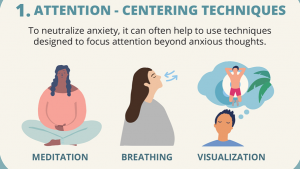COVID-19 (a new name for the Coronavirus disease 2019) is teaching us some lessons about anxiety and the impact of feeling prepared for possibilities. I’d like to invite you to join me in feeling empowered by taking meaningful actions to “flatten the curve” (as described in this Scientific American blogpost by Zeynep Tufekci) of a potential crisis.
Anxiety is a normal human response to threats, both perceived and real. If you want to manage your anxiety level and keep it at a healthy reality-based level, you can avoid hyper-sensational news headlines and social media posts, and stick to scientific sources of information.
In addition to reading Scientific American, I am also using the U.S. Centers for Disease Control website to stay updated on the latest numbers and any changes in where COVID-19 has been diagnosed.

Besides staying updated on real news about COVID-19, we’ve taken the usual steps that we do every flu season in our offices: You’ll find plenty of handsoap and water for washing (find out how here–>20-seconds each time — sing “Twinkle Twinkle Little Star” to time it, and bonus points if you sing it out loud!), as well as alcohol-based hand sanitizer, and of course, loads of tissues. These things are here for you, and your use of them could help keep a whole community healthy. (We even brought in a few more air-cleaning plants, because you never know… and they’re pretty.)
I’d like to encourage you to feel empowered to cancel any scheduled sessions if you or any of your household members are ill. Plus, I will be happy to hold your session appointments by phone or video, too, if you’re feeling up to it.
Finally, listen to those of us who’ve been here, done this: This is not the first virus outbreak to scare everyone into taking better care of themselves. Feeling panic at such times is only human, but it won’t protect you. If anything, panic could bump up your usual amount of stress and decrease your immune system’s response. So, do what you can to know what you must, unplug daily from the media chatter, take a few steps to feel empowered (like the ones mentioned in the Sci American blogpost,) and bring your gaze & focus back, time and again, to the important people and tasks in your life.
The National Institute for the Clinical Application of Behavioral Medicine (NICABM) offers a great infographic with 4 basic approaches to managing anxiety. Feel free to download it here and — most importantly — add some of these ideas to your own personal toolbox.

